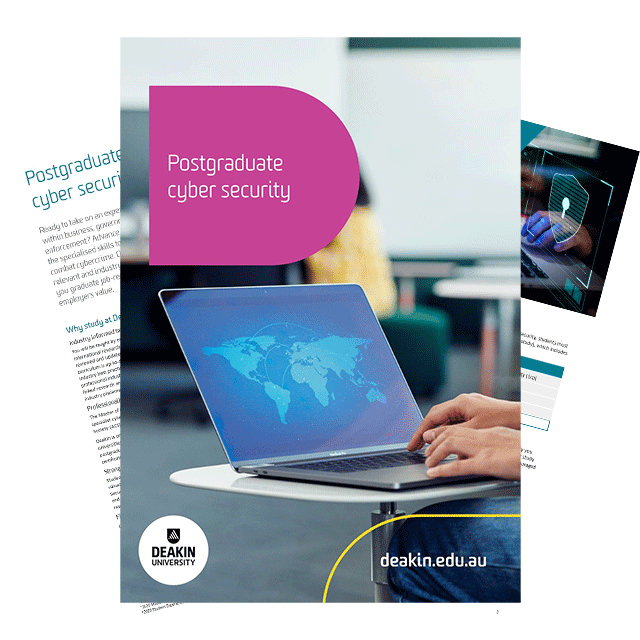Key facts
Duration
The time and cost could be reduced based on your previous qualifications and professional experience. This means you can fast track the masters degree from 2 years down to 1.5 years, or even 1 year duration. See entry requirements below for more information.
Locations
Key dates
Direct applications to Deakin for Trimester 2 2024 close 23 June 2024
Direct applications to Deakin for Trimester 3 2024 close 27 October 2024
Current Deakin Students
To access your official course details for the year you started your degree, please visit the handbook
Course overview
In an increasingly digital world, cyber attacks are an everyday occurrence. As a result, cyber security professionals are in high demand globally to protect organisations in all sectors from increasingly sophisticated cyber threats. Deakin’s Master of Cyber Security equips you with the specialised skills to investigate and combat cyber crime, and prepares you for a successful career in cyber security anywhere in the world.
Throughout the Master of Cyber Security, you will learn how to detect, analyse and confront cyber security challenges. You’ll focus on a range of studies, and gain knowledge about system security and digital forensics, analytics, organisational security and human aspects of cyber security. This vital experience prepares you to counter the number one criminal threat to modern-day society.
Graduate with the skills needed to thrive in a booming industry with a degree ranked in the top 1% globally for computer science and systems*
Ready to take on an expert security role within business, government or law enforcement?
Deakin’s Master of Cyber Security gives you the skills required to effectively and strategically respond to cyber security challenges from both a technical and organisational perspective. You will gain a solid understanding of cyber security concepts and industry practices, as well as the techniques and tools available to prevent and mitigate cyber security threats.
With access to current state-of-the-art software and hardware throughout the course, you will learn about digital forensics, security and privacy issues in analytics and network security. Through vital hands-on experience, you will gain the technical skills required to confidently investigate and combat cyber crime and cyberterrorism.
You’ll graduate ready for a variety of security roles within business, government and law enforcement. Examples include risk analyst, information security specialist, security system developer or programmer, cyber security consultant, security systems manager, security consultant, information security auditor or security manager. Combined with experience, you could take on roles such as chief security officer.
*2022 ShanghaiRankings Global Ranking of Academic Subjects
Read MoreCourse information
- Award granted
- Master of Cyber Security
- Year
2024 course information
- Deakin code
- S734
- CRICOS code?
- 093941G Waurn Ponds (Geelong)
- Level
- Higher Degree Coursework (Masters and Doctorates)
- Australian Qualifications Framework (AQF) recognition
The award conferred upon completion is recognised in the Australian Qualifications Framework at Level 9.
Course structure
To complete the Master of Cyber Security, you will complete 8, 12 or 16 credit points, depending on your prior experience.
The course is structured in three parts:
- Part A: Foundation Information Technology Studies (4 credit points)
- Part B: Mastery Cyber Security Studies (8 credit points)
- Part C: Cyber Security capstone units (4 credit points).
Depending upon prior qualifications and/or experience, you may receive credit for Parts A and B.
Students are required to meet the University's academic progress and conduct requirements.
4
Foundation Information Technology units
8
Mastery Cyber Security units
4
Cyber Security capstone units
16
Total
Core
Mandatory unit for all entry levels
Part A: Foundation Information Technology Studies
Part B: Mastery Cyber Security Studies
Part C: Cyber Security capstone units
Plus one (1) level 7 SIT or MIS-coded elective unit (one credit point).
~ Note: Students are expected to undertake SIT764 and SIT782 in consecutive trimesters. Students should seek advice from the unit chair if they are unable to complete SIT764 and SIT782 consecutively.
Intakes by location
The availability of a course varies across locations and intakes. This means that a course offered in Trimester 1 may not be offered in the same location for Trimester 2 or 3. Check each intake for up-to-date information on when and where you can commence your studies.
Trimester 1 - March
- Start date: March
- Available at:
- Waurn Ponds (Geelong)
- Online
Trimester 2 - July
- Start date: July
- Available at:
- Waurn Ponds (Geelong)
- Online
Trimester 3 - November
- Start date: November
- Available at:
- Waurn Ponds (Geelong)
- Online
*The 1 year full-time (8cp) version is only available as a part-time commencement in Trimester 3.
Additional course information
Course duration
Course duration may be affected by delays in completing course requirements, such as accessing or completing work placements.
Mandatory student checks
Any unit which contains work integrated learning, a community placement or interaction with the community may require a police check, Working with Children Check or other check.
Workload
You can expect to participate in a range of teaching activities each week. This could include lectures, seminars, practicals and online interaction. You can refer to the individual unit details in the course structure for more information. You will also need to study and complete assessment tasks in your own time.
Participation requirements
Elective units may be selected that include compulsory placements, work-based training, community-based learning or collaborative research training arrangements.
Reasonable adjustments to participation and other course requirements will be made for students with a disability. More information available at Disability support services.

Take the next step to a brighter future
Kickstart your career growth. We'll prepare you for the career you've always wanted.
Download course guideEntry requirements
Selection is based on a holistic consideration of your academic merit, work experience, likelihood of success, availability of places, participation requirements, regulatory requirements, and individual circumstances. You will need to meet the minimum academic and English language proficiency requirements to be considered for selection, but this does not guarantee admission.
Depending on your professional experience and previous qualifications, you may commence this course with admission credit and complete your course in 1 year full-time (or part-time equivalent).
Academic requirements
1 year full-time (or part-time equivalent) - 8 credit points
To be considered for admission to this degree (with 8 credit points of admission credit applied) you will need to meet at least one of the following criteria:
- completion of a bachelor degree (honours) (AQF 8) or higher in a related discipline
- completion of a bachelor degree in a related discipline, and at least two years' of relevant work experience (or part-time equivalent)
1.5 years full-time (or part-time equivalent) - 12 credit points
To be considered for admission to this degree (with 4 credit points of admission credit applied) you will need to meet at least one of the following criteria:
- completion of a bachelor degree or higher in a related discipline
- completion of a bachelor degree or higher in any discipline, and at least two years' of relevant work experience (or part-time equivalent)
2 years full-time (or part-time equivalent) - 16 credit points
To be considered for admission to this degree (without admission credit applied*) you will need to meet at least one of the following criteria:
- completion of a bachelor degree or higher in any discipline
^Recognition of Prior Learning into the Master of Cyber Security may be granted to students who have successfully completed appropriate postgraduate level studies.
Related disciplines which may be considered include: cyber security analyst, network security analyst, cyber threat analyst, incident responder, operations coordinator, penetration tester, cyber security advisor, vulnerability researcher, cyber security consultant, information security auditor, IT security engineer, digital forensics analyst, project manager, cyber security system developer or programmer, cyber security system manager, data scientists, security architects, security software developer, cloud security engineer.
*Credit for recognition of prior learning will still be considered on a case-by-case basis. Learn more below.
English language proficiency requirements
To meet the English language proficiency requirements of this course, you will need to demonstrate at least one of the following:
- bachelor degree from a recognised English-speaking country
- IELTS overall score of 6.5 (with no band score less than 6.0) or equivalent
- other evidence of English language proficiency (learn more about other ways to satisfy the requirements)
Admissions information
Learn more about Deakin courses and how we compare to other universities when it comes to the quality of our teaching and learning.
Not sure if you can get into Deakin postgraduate study? Postgraduate study doesn’t have to be a balancing act; we provide flexible course entry and exit options based on your desired career outcomes and the time you are able to commit to your study.
Recognition of prior learning
The University aims to provide students with as much credit as possible for approved prior study or informal learning.
You can refer to the Recognition of prior learning system which outlines the credit that may be granted towards a Deakin University degree and how to apply for credit.
Fees and scholarships
Fee information
Learn more about fees and your options for paying.
The available fee places for this course are detailed above. Not all courses at Deakin have Commonwealth supported places available. The 'Estimated tuition fee' is provided as a guide only based on a typical enrolment of students completing the first year of this course. The cost will vary depending on the units you choose, your study load, the length of your course and any approved Recognition of prior learning.
One year full-time study load is typically represented by eight credit points of study. Each unit you enrol in has a credit point value. The 'Estimated tuition fee' is calculated by adding together eight credit points of a typical combination of units for your course.
You can find the credit point value of each unit under the Unit Description by searching for the unit in the Handbook.
Learn more about fees and available payment options.
FEE-HELP calculator
What is FEE-HELP?
FEE-HELP loans cover up to 100% of tuition fees for eligible students. By taking out a FEE-HELP loan, the government pays your tuition fees directly to Deakin, and the balance is repaid from your employment income - but only once you're earning over $51,550.
Please note: fees shown by the calculator are indicative only and based on 2024 rates. Actual fees may vary. We advise confirming fees with Prospective Student Enquiries prior to enrolment.
Estimate your FEE-HELP
FEE-HELP payments
per pay cycle
Take-home pay
after FEE-HELP and tax
per pay cycle
Your estimated FEE-HELP repayments
- $* is the estimated full cost for a Master of Cyber Security (16 credit points), based on the 2024 fees.
- is the annual FEE-HELP payment, based on your current salary
- of your current salary be spent on FEE-HELP
*Disclaimer
Deakin University (Deakin):
- gives no warranty and accepts no responsibility for the currency, accuracy or the completeness of the information provided;
- advises users that no reliance should be placed upon on the information provided, and;
- instructs users that they should confirm the actual course fee with Prospective Student Enquiries prior to enrolment.
This tool provides indicative information about the fees that will be payable in respect of courses and subjects offered to prospective students domiciled in Australia during the periods indicated.
Please note that the fees shown by the calculator are indicative only and actual fees may vary. Users are advised to confirm the actual course fee with Prospective Student Enquiries prior to enrolment.
The estimated course fee is based on the tuition fee costs applicable to a domestic full time student commencing the course in Trimester 1 and studying full time for the duration of the course but:
- does not include non-tuition costs that may apply, such as Student Services and Amenities Fees (SSAF);
- does not take into account any scholarships or bursaries awarded to the student (including the 10% Deakin alumni discount);
- assumes the maximum number of units that need to be successfully completed actual number completed may be reduced if recognition of prior learning is granted;
- assumes that no exceptional, or non-typical, circumstances apply to the proposed course of study;
- assumes that the options that the user selects are appropriate for the course of study that they intend to undertake;
- where fees are estimated for future years those fee will be subject to annual increases in accordance with increases in the cost of course delivery.
Scholarship options
A Deakin scholarship might change your life. If you've got something special to offer Deakin – or you just need the financial help to get you here – we may have a scholarship opportunity for you.
Postgraduate bursary
If you’re a Deakin alumnus commencing a postgraduate award course, you may be eligible to receive a 10% reduction per unit on your enrolment fees.
Apply now
Some of our courses have limited places available - for the latest on courses still open for application, visit Courses by trimester.
Create an account in the Deakin Application Portal, start your application, enter personal details, education experience, upload supporting documents and submit. Need help? Play this video, or contact one of our friendly future student advisers on 1800 693 888 or submit an online enquiry.
For more information on the application process and closing dates, see the How to apply webpage. If you're still having problems, please contact us for assistance.
Entry pathways
Pathways for students to enter the Master of Cyber Security are as follows:
- Option 1: Graduate Certificate of Information Technology (followed by a 12 credit point Master of Cyber Security)
- Option 2: Graduate Certificate of Cyber Security(followed by an 8 credit point Master of Cyber Security)
Pathway options will depend on your professional experience and previous qualifications.
Alternative exits
- Graduate Certificate of Cyber Security (S535)
- Graduate Certificate of Information Technology (S578)
- Graduate Diploma of Cyber Security (S635)
Contact information
Our friendly advisers are available to speak to you one-on-one about your study options, support services and how we can help you further your career.
- Call us: 1800 693 888 Mon–Fri, 9am–5pm
- Live Chat: Mon–Thurs, 8am–7pm, Fri 8am–5pm
- Submit an online enquiry
- Help hub find common and trending questions and answers
Careers
Career outcomes
The rapid growth of cybercrime has created unparalleled opportunities for those with cyber security expertise, with jobs in the Database and Systems Adminstrators & ICT Security sector predicted to increase by 38.9% by November 2026*.
Career options are varied, you could work anywhere in the world as a:
- security analyst
- project manager
- security system manager
- consultant
- security system developer or programmer information security auditor
- business continuity or IT security engineer.
*Jobs and Skills Australia, 2021 Employment projections for the five years to 2026.
Professional recognition
The Master of Cyber Security is professionally accredited with the Australian Computer Society (ACS).
Course learning outcomes
Deakin's graduate learning outcomes describe the knowledge and capabilities graduates can demonstrate at the completion of their course. These outcomes mean that regardless of the Deakin course you undertake, you can rest assured your degree will teach you the skills and professional attributes that employers value. They'll set you up to learn and work effectively in the future.
| Deakin Graduate Learning Outcomes | Course Learning Outcomes |
| Discipline-specific knowledge and capabilities | Develop specialised and essential knowledge of security needs for design and development of secure systems, processes, concepts, and technologies; to develop software systems, products and solutions that automate business processes at par with benchmarks and industry standards and based on evolving cyber security needs. Develop extended knowledge in the development and use of techniques, systems and approaches for secure communication and the systematic analysis of systems for features related to cyber security. |
| Communication | Communicate effectively to design, evaluate, and respond to advances in technology in the cyber security context, future trends and industry standards and utilise a range of verbal, graphical and written forms, customised for diverse audiences including specialist and non- specialist. |
| Digital literacy | Utilise a range of digital technologies and information sources to discover, select, analyse, synthesise, evaluate, critique, and disseminate both technical and professional information in the context of cyber security. |
| Critical thinking | Appraise complex information using critical and analytical thinking and judgement to identify problems, analyse user requirements and propose appropriate and innovative cybersecurity solutions. |
| Problem solving | Generate cyber security solutions through the application of specialised theoretical constructs, expert skills, and critical analysis to real-world, ill-defined problems to develop appropriate and innovative cyber security solutions. |
| Self-management | Take personal, professional, and social responsibility within changing national and international professional IT and cybersecurity contexts; to develop autonomy as researchers and evaluate own performance for continuing professional development. Work autonomously and responsibly to create cyber security solutions to new situations and actively apply knowledge of theoretical constructs and methodologies to make informed decisions. |
| Teamwork | Work independently and collaboratively towards achieving the outcomes of a group project, thereby demonstrating interpersonal skills including the ability to brainstorm, negotiate, resolve conflicts, manage difficult and awkward conversations, provide constructive feedback, and demonstrate the ability to function effectively in diverse professional, social and cultural contexts. |
Approved by Faculty Board 23 September 2021.




